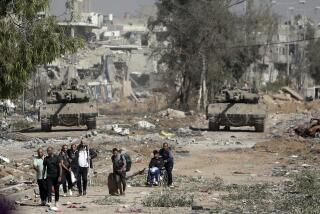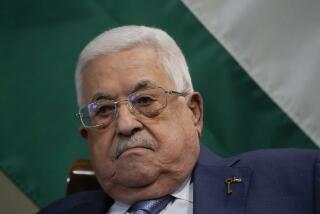NEWS ANALYSIS : ASSASSINATION IN THE MIDDLE EAST : Peres Faces Immediate Task of Keeping Weak Coalition Intact
- Share via
Foreign Minister Shimon Peres, the architect of Israel’s search for peace with its Arab neighbors, took over as the country’s acting prime minister Saturday and faces an immediate challenge in holding together the weak coalition with which Prime Minister Yitzhak Rabin had governed.
Under Israeli law, President Ezer Weizman must determine whether Peres can win a majority in the Knesset, the country’s parliament. Rabin had the slimmest of majorities--61 out of 120 Knesset members--and came perilously close at times to losing crucial votes of confidence.
If Peres fails to hold together that coalition of leftist and centrist parties and form a Cabinet of his own within three weeks, Weizman would likely ask Benjamin Netanyahu, chairman of the rightist opposition Likud Party, to attempt to do so.
A Netanyahu-led government, however, would likely be based on Likud’s adamant opposition to the current peace process, and it could seek to reverse some of Israel’s recent agreements with the PLO on Palestinian self-rule.
Throughout this process, both Labor and Likud will be negotiating for the support of the half-dozen smaller parties that populate the Israeli political scene and often provide the decisive edge in the formation of governments there.
As the price for their participation in a coalition, these parties sometimes demand additional Cabinet seats or insist on special legislation.
If Peres does succeed in forming a government--and members of the coalition are likely to rally to his support in this crisis--Likud is certain to argue that, because of its transitional character, it lacks the moral authority to make the substantial territorial concessions necessary for peace with Syria and the extension of Palestinian self-rule on the West Bank.
A third possibility--one long advocated by Weizman himself--would be a national unity government, bringing together the Labor Party, now led by Peres, and the Likud. That would certainly slow, if not halt, further Israeli negotiations with the Palestine Liberation Organization and with Syria.
Any government, however, will be a transitional one, for under law Israel must hold parliamentary elections in the coming year. That vote is certain to amount to a referendum on the peace process, particularly the controversial accords with the PLO. The election could be held as late as next October, but could be called for early spring.
Peres, appearing at a news conference after an emergency Cabinet meeting hours after Rabin’s assassination, said only that initial steps had been taken to ensure stability.
“The Cabinet had to choose someone” as prime minister, he said, “and they have done so.”
In a related move, Ehud Barak, a former army chief of staff, was reportedly moved from Interior minister to defense, a post that Rabin had held as well as the premiership.
Peres, 72, had served under Rabin as foreign minister since the Labor Party came to power in 1992. Longtime rivals within Labor, the two had developed a new partnership in their search for peace. The two men shared the Nobel Peace Prize with PLO Chairman Yasser Arafat in 1994.
“He was excited and happy on his last day, which turned into a day of tragedy for all of us,” Peres said, reflecting on Rabin’s speech at the peace rally in Tel Aviv at which he was shot and killed.
Rabin had defeated Peres for leadership of Labor three years ago as party members concluded that, with his military credentials, Rabin could win renewed support from the electorate.
Peres served as defense minister during Rabin’s first term as prime minister from 1974 to 1977. They reversed roles when Peres was prime minister in a unity government with Likud in 1984 to 1986.
Erudite, widely read and a writer of admired poetry, Peres was born in Poland. He came as a boy to Israel in 1934 while it was British-administered Palestine.
A key assistant to David Ben-Gurion, Israel’s first prime minister, Peres has held every key Cabinet post through the years.
(BEGIN TEXT OF INFOBOX / INFOGRAPHIC)
Profile: Shimon Peres
* Age: 72
* Born: Poland
* Education: Harvard, New York universities
* Family: wife Sonia; three children: Jonathan, Nechemia, Zvia.
* Career highlights:
1934: Emigrated to Palestine.
1953: Director general, ministry of defense.
1959: Elected to the Knesset.
1969-70: Minister for economic development in administered areas and for immigrant absorbtion
1969-70: Minister of transport and communications
1970-74: Minister of information
1974-77: Minister of defense
1977-84: Minister of interrior and religious affairs
1984-6: Prime Minister in unity government with rival Likud Party
1992-present: Foreign minister
1994: Shared Nobel Peace Prize with Rabin and PLO Chairman Yasser Arafat
More to Read
Sign up for Essential California
The most important California stories and recommendations in your inbox every morning.
You may occasionally receive promotional content from the Los Angeles Times.













